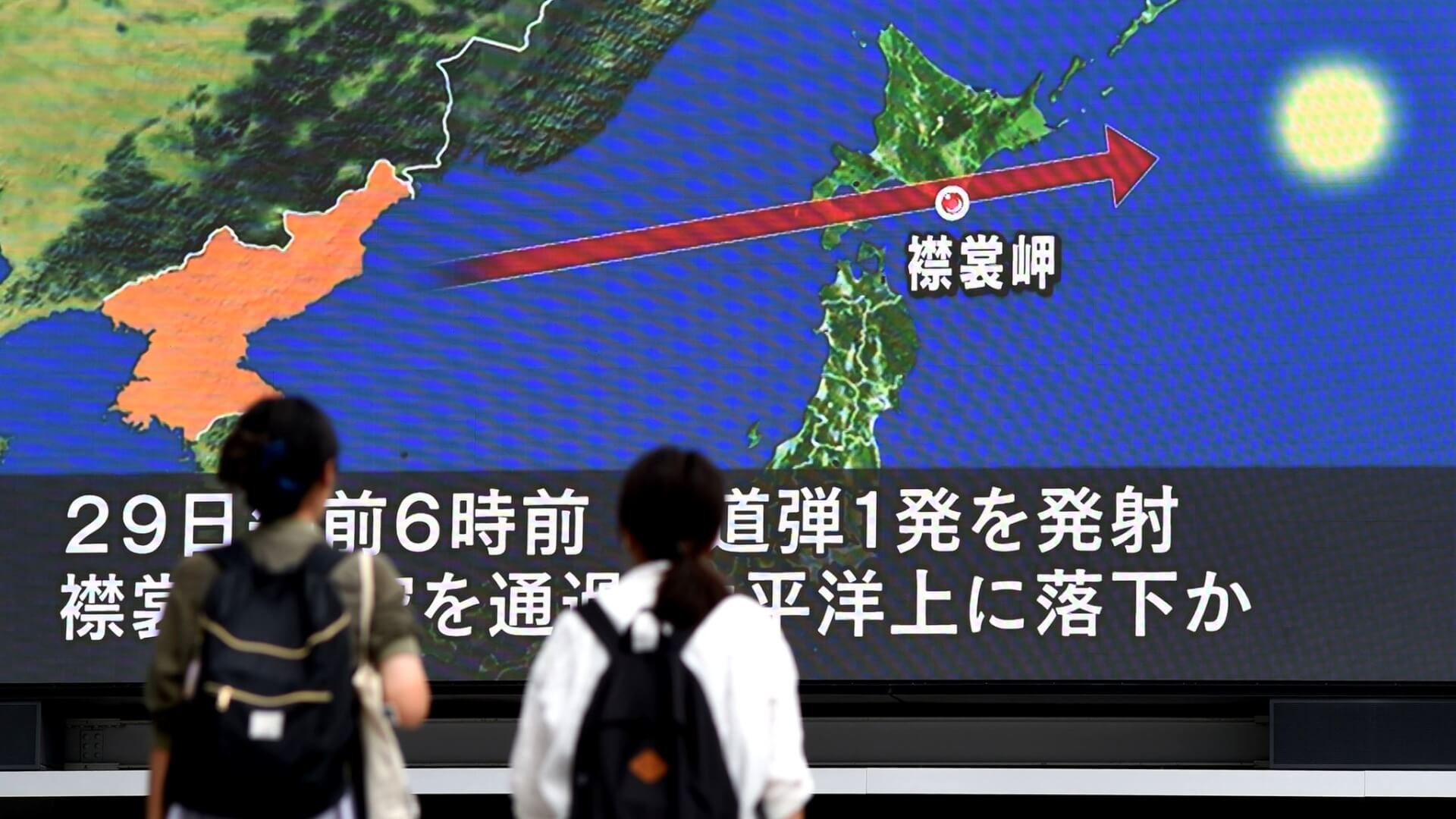North Korea fired an intermediate-range ballistic missile (IRBM) over Japan on Tuesday, marking its first launch of an IRBM in eight months and a continued escalation in its assumed path towards its seventh nuclear test.
The South Korean military’s Joint Chiefs of Staff (JCS) said it detected the launch from Mupyong-ri in the northern province of Jagang at 7:23 a.m. The missile travelled around 4,500 kilometres at a maximum altitude of 970-1,000 kilometres and at a top speed of Mach 17. The missile flew past Japan.
Intelligence authorities in South Korea and the United States (US) are currently conducting a detailed analysis to verify other specifics of the missile.
In a text message sent to reporters, the JCS said that North Korea’s “series of ballistic missile provocations” will only “further strengthen deterrence and the response capabilities of the South Korea-US alliance” and “only deepen the North’s isolation from the international community.”
NORTH KOREA MISSILE SCARE
— BNO News (@BNONews) October 3, 2022
- Launch detected at 6:22 p.m. ET
- Overflew Japan, towards the Pacific
- Japan issued rare emergency alert
- People nationwide were told to seek shelter
- Missile no longer poses a threat
- Unclear if missile is still in the air
It called the launch a “significant” provocation that “undermines peace and stability not only on the Korean Peninsula but also in the international community,” noting that it is a “clear” violation of the United Nations (UN) Security Council resolutions. “While strengthening our monitoring and vigilance, our military is maintaining a full readiness posture in close cooperation with the US,” the JCS added.
Shortly after the launch, South Korean President Yoon Suk-yeol warned of a “resolute” response. “North Korea again launched an intermediate range ballistic missile of around 4,000 kilometers over the Japanese archipelago,” he told reporters. “As I stated on October 1, Armed Forces Day, such reckless nuclear provocations will be met with a resolute response from our military and our allies, as well as the international community,” he said. Yoon revealed that the country’s National Security Council will meet to discuss the launch and he will join the session midway.
Similarly, Japanese Prime Minister Fumio Kishida “strongly condemned” the “outrageous act” and noted that he had convened a meeting with the National Security Council to discuss further steps.
UPDATE: South Korea's Joint Chiefs of Staff provided this F-15K flight video. pic.twitter.com/2Q1qwB4lSv
— NK NEWS (@nknewsorg) October 4, 2022
In fact, Japanese authorities alerted residents in the country’s northeastern regions and ordered them to evacuate to shelters. It raised the first “J-alert” alert since 2017, when Pyongyang fired an intermediate-range Hwasong-12 missile twice over its territory in a short span of a few weeks.
Train services were also suspended in the Hokkaido and Aomori regions until the government issued a notice announcing that the missile appeared to have landed in the Pacific Ocean. In addition, subway services were temporarily suspended in Sapporo, the capital of Japan’s Hokkaido prefecture.
SOUND ON: Air raid sirens wail in cities and towns around Japan, after North Korea fired a ballistic missile over the country, prompting the Japanese government to warn citizens to take shelter. https://t.co/Y4YR7eXv8S pic.twitter.com/LRvYhsY4II
— ABC News (@ABC) October 4, 2022
Late on Monday, the United States’ (US) National Security Advisor, Jake Sullivan, spoke with his counterparts in Japan and South Korea regarding the latest launch. The White House said that Sullivan consulted both diplomats “on appropriate and robust joint and international responses” and “reinforced” the US’ “ironclad commitments to the defence” of Japan and South Korea.
It denounced North Korea’s “dangerous and reckless” action and said it “shows (North Korea’s) blatant disregard for United Nations Security Council resolutions and international safety norms.” The statement went on to say that Washington “will continue its efforts to limit” Pyongyang’s “ability to advance its prohibited ballistic missile and weapons of mass destruction programs, including with allies and UN partners.”
The test marked Pyongyang’s fifth launch since late September. It launched one short-range ballistic missile (SRBM) on 25 September, followed by two last Wednesday, another two on Thursday, and two on Saturday.
📣 “North Korea has fired a missile. Please take shelter inside a building or underground.”
— Al Jazeera English (@AJEnglish) October 4, 2022
This is the warning aired to some residents on Japan's streets as North Korea launched a ballistic missile over the country ⤵️ pic.twitter.com/JckLjd6VQr
The series of recent tests come days after the US Navy’s nuclear-powered aircraft carrier USS Ronald Reagan arrived in South Korea for a four-day joint military drill. Amid the looming threat of a nuclear North Korea, the navies of South Korea, the US, and Japan staged trilateral anti-submarine exercises last week for the first time in five years.
North Korea has conducted over 40 missile tests this year, including six Intercontinental Ballistic Missiles (ICBMs). The US and South Korea have warned that the Kim Jong-un administration has already completed preparations to carry out a seventh nuclear test, the country’s first since 2017.

